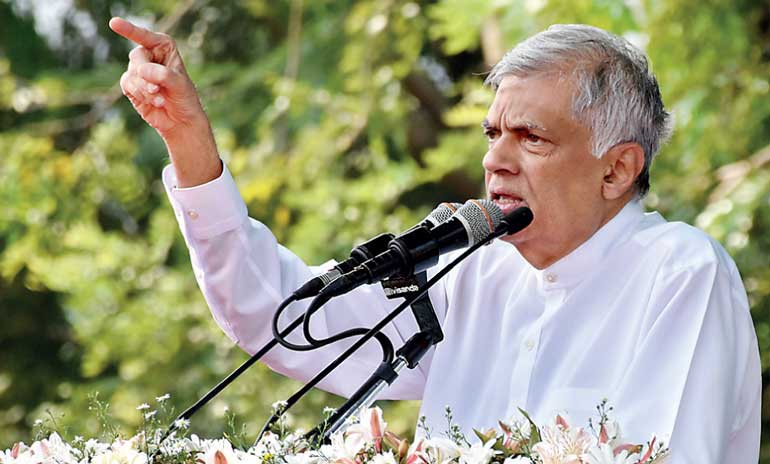Tuesday Feb 17, 2026
Tuesday Feb 17, 2026
Monday, 8 January 2018 01:00 - - {{hitsCtrl.values.hits}}

Prime Minister Ranil Wickremesinghe addressing the meeting at Campbell Park - Kushan Pathiraja
Kicking campaigning for the upcoming Local Government elections into a new gear, Prime Minister Ranil Wickremesinghe yesterday said the Government would have to pay a whopping Rs. 10 trillion over the next 25 years due to allegedly irregular bond sales of Rs. 4 trillion from 2008 to 2015 without the Central Bank’s Monetary Board approval.
Attending a special Convention at Campbell Park yesterday accompanied by stalwarts of the United National Party (UNP), including Deputy Leader Ravi Karunanayake and General Secretary Kabir Hashim, the Prime Minister spoke in detail about the bond report and its repercussions. As the bond report had recommended an audit on alleged irregularities in bond sales from 2008-2015, Wickremesinghe insisted the Government was committed to beginning investigations into these allegations “as soon as possible.”
The Prime Minister also noted that he had no objection to convening Parliament early to debate the report handed over to President Sirisena and was fully prepared to make the request of Speaker Karu Jayasuriya. He also recounted how he had appointed the Pitipana Commission, which led to the probe by the Committee on Public Enterprises (COPE) chaired by MP Sunil Hadunetti and later the appointment of the Presidential Commission of Inquiry.
“Under what other Government have there been three debates in Parliament about a corruption issue? What other Government saw the Prime Minister and top ministers giving evidence before a Presidential Commission? All those who support good governance should rest assured that we are here to fight corruption and we will take legal action against wrongdoers. We will work with transparency,” he said.
Wickremesinghe stated that he had assisted investigations at every point, making repeated requests to the Attorney General’s Department for advice, and coordinating with the Central Bank and other officials.
He blamed former president Mahinda Rajapaksa for leaving the country with high levels of debt and insisted the parliamentary debate on the bond report would be an ideal occasion to raise questions about the bond transactions during the previous administration.
“I have instructed the Finance Minister and Public Enterprise Development Minister Kabir Hashim to safeguard all documents within the Central Bank, National Savings Bank and Sri Lanka Insurance. Who stole Rs. 10 trillion? Since there has already been talk about the (allegedly) Rs. 10 billion loss then lets debate the Rs. 10 trillion as well.”
“I’m waiting for the media, who reported so assiduously on the Presidential Commission, to also start questioning about the bond sales during the previous administrations. If they do not do so I will ask them if they are afraid,” he said.
Rejecting criticism over the slow progress of investigations, Wickremesinghe said 19 cases had been filed, 40 were still under investigation by the police and 24 files are likely to be probed at the second Presidential Commission, which President Sirisena had earlier announced would be appointed in January.
The Government was also proceeding with plans to set up new courts and a team had been appointed by the Attorney General to focus on cases, but he conceded the process would take time.
“People who destroyed the economy of this country in the past are now asking to be handed the villages. If they cannot take care of the national economy how can they take care of the village? Rajapaksa held elections two years early because he was afraid of the economic plight he had pushed this country into and then he just ran away. We took on the challenge. We stabilised the economy and set it on the path to development. We can do the same at the village level too.”
“You gave us the country in 2015. Now give us the village,” he told the gathering.
Recalling the previous poor record of women’s representation, Wickremesinghe pointed out it was the UNP which had introduced the 25% quota system and thereby given women a stronger chance of getting elected. He therefore called on women to vote for the UNP and pledged to work for more women’s rights in the future.
The Prime Minister also gave a detailed account of the steps taken to develop the economy, highlighting the economic plans, progressive Budget and steps to establish new factories and investment zones as well as attract foreign investment.